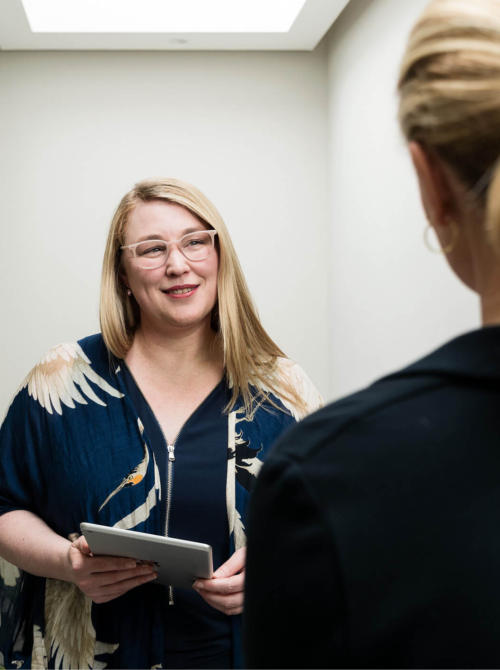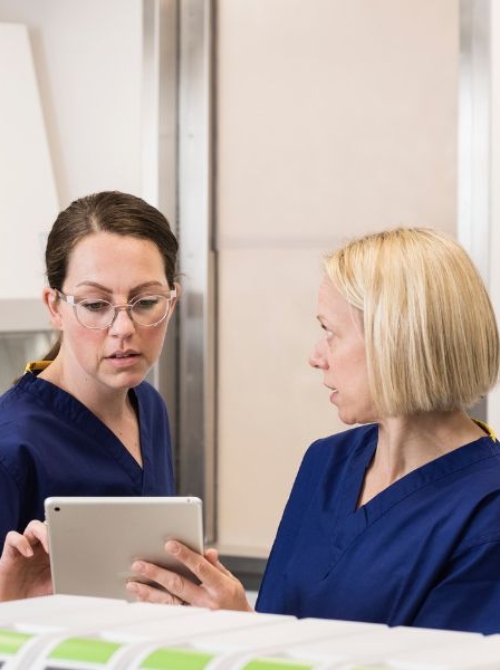I wish I knew this before doing IVF
We asked our Instagram followers what they wish they’d have known, before starting IVF.
Read on for some great advice, including preparation, what to ask in your consultation, how to manage the emotions and juggle IVF with work commitments.
I wish I knew this before starting IVF
We asked our Instagram followers what they wish they knew before starting IVF… here are their top tips on what you need to know, before starting treatment.
How much it stops future planning, from booking holidays to attending social events.
TTC means you end up living in two-week cycles of hope and despair.
When you layer on top IVF, you’re living your entire year in “what ifs” and “maybes”.
Book that holiday, say yes to that wedding invite. And then deal with what MAY happen, WHEN it happens.
How hard it will also be on your partner.
IVF is tough on the partner too. But often just because they’re not the ones physically going through it, they’re not given as much support.
Everyone needs to deal with this in their own way, but we regularly get feedback that talking about your experience is often the unlock to feeling less alone.
If you’re looking for male support in particular, we’d recommend following @themalefertilitypodcast @testhimltd, @fertility4men and @knackered_knackers.
Chronic conditions, such as endometriosis, will make IVF a necessity, even if you’re considered “younger”.
This is such an important point, and something that is often dismissed or not identified as a fertility blocker, until it’s too late.
We spend a lot of time educating people on what’s normal, and what is perhaps a red flag (i.e.: the period so bad you couldn’t leave the house for four days a month.
If you’ve suffered from chronic periods for years, abnormal cycles or debilitating pelvic pain, get yourself checked out, to rule out conditions such as endometriosis.
It could lead to a diagnosis and treatment, meaning you can start TTC naturally and hopefully avoid invasive fertility treatments further down the line.
Or, it may mean you get a quicker diagnosis and skip to IVF – wasting no more time and instead hopefully starting your family.
How important the three months are, before you start IVF treatment.
Prepare. Prepare. Prepare.
Always ask your consultant if there is anything you can do in the run up to treatment, to better your chances.
If this means delaying treatment for a few months whilst you investigate potential concerns, or pause to take supplements to help improve the egg or semen quality, then do so.
You don’t ever want to regret rushing ahead and possibly wasting time (and money).
That your treatment should be tailored to you (I feel like I wasted a cycle).
A super important one, and one we focus on here at The Evewell.
Your treatment plan should be tailored to your unique fertility health and history, you shouldn’t be boxed into a templated treatment plan, just because that clinic isn’t open at weekends, or doesn’t consider gynaecological conditions as the reason you’re not conceiving.
One size does not fit all.
How long it takes, and the endless waiting between each stage 😫
There is A LOT of waiting.
- Waiting for your period so you can start.
- Waiting for your ovaries to start stimulating.
- Waiting to see how your follicles are developing.
- Waiting for your egg collection date.
- Waiting to see how many eggs fertilise.
- Waiting to see how your embryos develop.
And then the worst wait of all… The Two Week Wait (which is actually ‘only’ 10 days).
Having a good understanding of how long the process will take, and what to expect, is something we recommend asking during your first consultation.
Read a brilliant article on the Top Questions to ask during your Consultation by @emmatheembryologist.
How often I’d need to be in the clinic, and how to balance it with work commitments.
This is a biggie, and often the reason why people delay treatment.
Everybody reacts differently to fertility medication, and the problem is: you won’t know how you react until you start treatment.
Some people find they can continue working and live a relatively normal life (mainly toning down social commitments), whereas others prefer to take time off work.
Listen to your body, and react accordingly. Don’t over commit yourself, work from home if you need to and definitely, try to get as much rest as you can (your body is working overtime already!)
Use your Nurses Consultation to ask all the questions you have, so you feel prepared and fully aware of how many times you’ll be expected to be in the clinic, how long each appointment will be (you can even request early appointments to manage around work or family commitments).
And if you do decide to continue working – like a lot of our patients have to – consider telling your line manager, or someone you trust at work. You may be surprised at how supportive they can be – or better still, your workplace may even offer you paid time off.
Read an article on How to Balance IVF and Work here.
How long you might need to wait between egg collection and a FET.
This is all very much dependant on your age and fertility history, but once you have that precious embryo, you want to give it the best possible chance of implantation and pregnancy.
Sometimes this may mean hitting pause and reassessing, before having a frozen transfer, rather than rushing into a fresh transfer – which we know can be difficult, but there will be good reason, if your consultant recommends this.
Always ask your consultant if there is anything additional they recommend you planning into your pre-transfer stage, such as supplements, or additional testing like: PGT-A, ERA, NKC, to give you the best possible chance of that precious embryo becoming a baby.
We know how hard you fight to get these embryos, so if these are recommendations, it’s only because the team will work collectively to give embryo the best chance of success.
You might need more than one round of IVF.
Have you heard the term family planning? Not in the ‘how not to get pregnant’ sense, more in the ‘how to plan for your final family’.
Depending on a number of different factors, such as: your age, fertility history and your ‘final family’ goals, if you know you want more than one child, always ask your doctor if it might be worth considering a second egg collection, before having your first embryo transfer.
By having multiple egg collections and freezing embryos BEFORE you do your embryo transfer, you’re giving yourself a better chance of future siblings, and more crucially, may mean you avoid future egg collections when you and your eggs are much older.
The “IVF Funnel” and the endless hurdles to keep jumping through.
A lot of people don’t understand the reality of The IVF Funnel, until they’ve been through at least one round of IVF. IVF is rarely a straightforward process and it’s true: there are a lot of hurdles to jump over.
Swipe to see a good example of The IVF funnel, and give @emmatheembryologist’s feed a follow – she’s spent a lot of time sharing her knowledge so you can get a better understanding of what to expect (at every stage of the funnel).
How difficult the Two Week Wait is…
The two-week wait is one of the most difficult stages of any fertility journey.
We asked Trudi, our Nursing Director, what it means to be in the two-week wait, what symptoms to expect and how to survive this time. See here.
It’s a club no one wants to join but the members are incredible.
Infertility is the worst club to be in, but it has the best members.
How little it’s spoken about, and how isolating it can make you feel, even with the people you love.
We have first-hand experience of this and know exactly how isolating it can be; watching friends or family have their first, then their second baby… whilst you’re still struggling to get off the starting block.
But the more we talk about this, the more we normalise IVF.
Do what you can to find your tribe of supporters and cheerleaders!
That you might not always be successful on the first (or even second) round…
Sadly this is the case for a lot of IVF patients.
Maybe you can’t get pregnant, or perhaps you can’t stay pregnant. Either way, your consultant needs to be honest with you about your chances of success are, before you start treatment.
Before you have treatment, ask them what they recommend. And if you’re on your second, or third round, ask them what you can do differently next time, or if there is anything you need to plan into the pre-treatment phase, to help improve your chances of success (such as additional tests, which supplements to take and any lifestyle changes you might need to consider).





